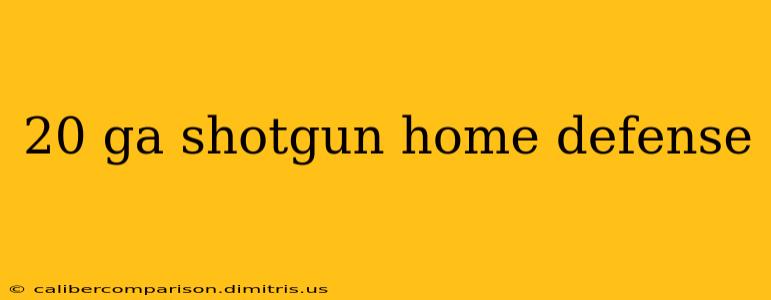Choosing the right firearm for home defense is a critical decision, demanding careful consideration of various factors. While many gravitate towards larger calibers, the 20 gauge shotgun presents a compelling option, offering a potent blend of stopping power, manageable recoil, and practical advantages. This comprehensive guide explores the viability of a 20 gauge shotgun for home defense, analyzing its strengths and weaknesses to help you make an informed choice.
Why Consider a 20 Gauge for Home Defense?
The 20 gauge shotgun often gets overlooked in the home defense conversation, overshadowed by its larger 12 gauge counterpart. However, it boasts several key advantages:
-
Reduced Recoil: This is perhaps the most significant benefit. The lighter recoil makes follow-up shots quicker and easier, especially crucial in high-stress situations. For smaller or less experienced shooters, the reduced recoil translates to improved accuracy and control.
-
Lighter Weight: 20 gauge shotguns are generally lighter than 12 gauge models, making them easier to maneuver and handle, particularly important during close-quarters combat within a home.
-
Less Noise: While not dramatically quieter, the 20 gauge produces slightly less noise than a 12 gauge, potentially reducing the risk of hearing damage for both the shooter and anyone nearby.
-
More Ammunition Capacity: Some 20 gauge shotguns offer higher magazine capacities than comparable 12 gauge models, enabling more shots before reloading.
-
Maneuverability: The lighter weight and often more compact design contribute to improved maneuverability in confined spaces.
Ammunition Considerations for Home Defense
The choice of ammunition is paramount. For home defense, focus on ammunition designed for maximum stopping power and penetration, while minimizing overpenetration (the risk of rounds passing through the target and injuring someone beyond). Consider these options:
-
Buckshot: Offers multiple projectiles per shot, increasing the likelihood of hitting a vital area. Choose a load with a suitable number of pellets (e.g., 00 buck or #1 buck) for optimal stopping power.
-
Slugs: Deliver a single, large projectile offering impressive stopping power, but with a tighter spread pattern. Slugs are best suited for longer ranges or scenarios where overpenetration is less of a concern.
-
Reduced-Recoil Loads: Many manufacturers offer reduced-recoil 20 gauge ammunition that retains substantial stopping power while mitigating recoil. This is a good option for those sensitive to recoil or those seeking easier follow-up shots.
Disadvantages of a 20 Gauge for Home Defense
While the 20 gauge offers advantages, it's essential to acknowledge its limitations:
-
Less Stopping Power than 12 Gauge: A 12 gauge generally delivers more stopping power due to its larger shot size and higher velocity.
-
Availability of Ammunition: While readily available, the selection of 20 gauge ammunition, especially specialized home defense loads, may be slightly more limited than 12 gauge options.
Conclusion: Is a 20 Gauge Right for You?
The suitability of a 20 gauge shotgun for home defense depends on individual circumstances and preferences. It's an excellent choice for smaller or less experienced shooters who prioritize manageable recoil and lighter weight. However, those seeking maximum stopping power might find a 12 gauge more suitable. Ultimately, the best approach is to carefully consider your needs, physical capabilities, training level, and local regulations before making a decision. Seek professional guidance from experienced firearms instructors to enhance your understanding and proficiency with any chosen firearm. Remember, responsible gun ownership and proper training are crucial for safe and effective home defense.

